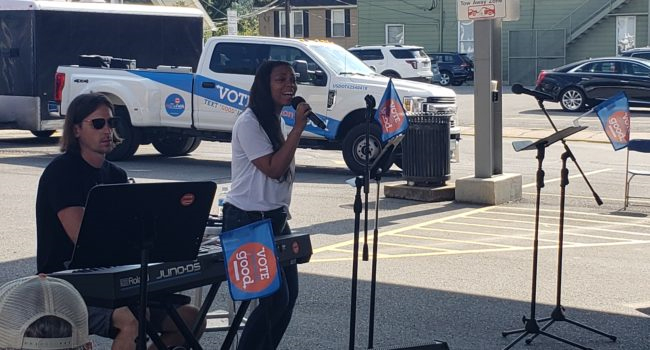MORGANTOWN, W.Va. — A group of evangelical Christians are traveling the nation to spread the word; or perhaps, more fittingly, they are traveling to spread many words.
The “Vote Common Good” tour stopped in Morgantown last weekend to rally support for the Democratic Party, a place that evangelicals generally don’t call home on Election Day.
“We think that the Republican Party has a responsibility,” said Doug Pagitt, Executive Director of Vote Common Good. “We think any party that’s in control of Congress has a responsibility to the common good, and the Republican Party has shirked that responsibility by their policies, by their attitudes, and by their support of the Trump Administration.”
Pagitt, an evangelical pastor, cited the inhumane treatment of immigrant children as one of just several reasons to try and rally traditionally conservative voters to the polls and make a change in how they vote.
“And we want to encourage religious people, who often feel restricted in their voting options, to vote their faith and not their Republican impulse,” Pagitt said.
Traditionally, the Republican Party has had a strong tie with the evangelical Christian voting bloc — believed to make up approximately 25 million people in the U.S. electorate. Around 80 percent of evangelicals tend to vote Republican, according to significant exit polling returns.
“We know that Christian people are supposed to function with all the other non-religious and religious people in the country,” Pagitt said. “But, very often, progressively-minded religious people stay quiet. We’re not trying to convince someone what good is. We think people know what good is. We’re trying to encourage people that already know that what’s going on is no good.”
WVGOP Chairman Melody Potter is an evangelical Christian herself — and said her fellow voters should feel right at home in the Republican Party.
“Evangelicals should stick with the Republican Party,” she said. “Evangelicals are basically voting Republican mostly because of the pro-life issues, which is in our party platforms, on national defense, and also because they wanted what the President promised to do — and he did — they wanted the U.S. embassy (in Israel) moved to Jerusalem.”
Potter added: “I’m an evangelical, and I am the chairman of the Republican Party in West Virginia. And if I didn’t believe in what I talked about and believed in our platform, I wouldn’t be doing what I’m doing.”
Even Pagitt recognizes that whatever gains he hopes to make are likely going to be small, but he said those gains are potentially worth the effort.
“We think there’s 10 to 15 percent of encouragable (sic), progressively-minded religious people — especially Evangelicals who really feel homeless,” he said.
“Their faith calls them to one kind of common goodness, and their association feels like it’s counter to that.”
Potter, though, also praised GOP-led tax cuts, suggesting they were another avenue for Evangelical voters to engage with their religion.
“That group should be happy about that because the tax cuts will put more money in people’s pockets so they can pay more tithes to the church — among other things,” she said. “If they’re truly evangelicals, that should be something they are looking at.”
Pagitt, meanwhile, is confident that his touring band of evangelicals can raise awareness of the issues.
“I think a lot of people don’t spend a lot of time thinking about politics — especially the religiously minded people,” he said. “That’s just not their thing. So they have one or two topics they ever think about. Of those four out of five Evangelicals that vote for Republicans, many of them won’t know the name of the person they’re voting for before they walk in the voting booth. They’ll just pick the letter.”
Vote Common Good is a non-partisan group, engaging in a 31-city bus tour. Though they are supporting all Democratic candidates in 2018, Pagitt did caution that “was because they were the best alternative right now.”




